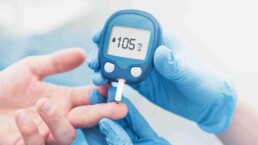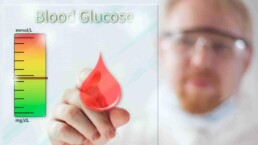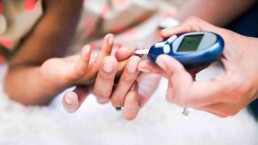Dr. Good Deed’s Health Clinic in Patna! Our team of skilled general physicians, Neurologist and gastroentrologist experts provides comprehensive healthcare solutions. Enjoy minimal wait times at our convenient Kankarbagh and Boring Road clinics. Experience the convenience of online consultations for quality healthcare from home.
What is Diabetes?
When your blood glucose, commonly known as blood sugar, is too high, you develop diabetes. Your body uses glucose as its primary energy source. Although glucose can be produced by the body, it also comes from the food you eat.
The pancreas produces the hormone insulin, which aids in the transport of glucose into your cells for use as an energy source. If you have diabetes, your body either doesn’t produce any insulin at all or uses it improperly. After that, the glucose stays in your blood and doesn’t get into your cells.
Diabetes increases the risk of harm to the heart, kidneys, nerves, eyes, and kidney function. Your chance of acquiring diabetes-related health issues may be reduced by taking measures to avoid or control diabetes.

What are the different types of diabetes?

Pregnancy diabetes
One form of diabetes in pregnancy seems to be known as gestational diabetes. This type of diabetes usually disappears after the baby is born.However, if you had gestational diabetes, you had a higher risk of developing type 2 diabetes in the future.

Prediabetes
Individuals with prediabetes have blood sugar levels that are higher than usual but not high enough to be identified as having type 2 diabetes. You run an increased risk of getting type 2 diabetes if you currently have prediabetes. Compared to people with normal glucose levels, you also have an increased chance of developing heart disease.

Type 1 diabetes
For those with type 1 diabetes, their bodies produce little or no insulin. Your immune system targets and kills the insulin-producing cells in your pancreas. Although it can occur at any age, type 1 diabetes is most commonly diagnosed in children and young adults.

Type 2 diabetes
The cells in your body don’t utilise insulin effectively if you have type 2 diabetes. Although the pancreas may produce some insulin, it does not produce enough to keep your blood glucose levels within the usual range. The most prevalent type of diabetes is type 2. If you have risk factors for the disease, like being overweight or obese and having a family history of the condition, you are more likely to acquire type 2 diabetes. Type 2 diabetes can occur at any age, even in infancy.
Knowing the risk factors and making changes to your lifestyle, such as decreasing weight or limiting weight gain, can help you delay or prevent type 2 diabetes.
What are Diabetes Symptoms ?
Blood sugar levels influence the severity of diabetes symptoms. Some people show no symptoms, especially if they have prediabetes, gestational diabetes, or type 2 diabetes. The symptoms of type 1 diabetes often appear suddenly and are very severe.
Both type 1 diabetes and type 2 diabetes can have the following symptoms:
- noticing a greater than normal thirst.
- frequent urination.
- weight loss without exerting effort.
- becoming worn out and fragile.
- irritated or experiencing other mood swings.
- vision that is hazy.
- getting several infections, including vaginal, skin, and mouth infections.
What Causes Diabetes?
Diabetes, no matter what is caused by excess glucose in the blood. However, depending on the type of diabetes you have, there are several causes for elevated blood glucose levels.
Diabetic causes include
Insulin resistance: Insulin resistance is a major contributor to type 2 diabetes. When your muscles, fat, and liver cells don’t react to insulin as they should, you have insulin resistance.
Insulin resistance is caused by diseases and conditions such as obesity, inactivity, poor nutrition, hormonal imbalances, genetics, and certain medications.
Type 1 diabetes is an autoimmune disease that develops when the immune system destroys the pancreatic cells that make insulin.
Unbalanced hormones: The placenta generates hormones throughout pregnancy that lead to insulin resistance. If your pancreas does not produce enough insulin to overcome insulin resistance, you may develop gestational diabetes. Type 2 diabetes can also result from other hormone-related disorders, such as acromegaly and Cushing’s syndrome
Type 3c diabetes can arise from physical harm to your pancreas, which can result from a condition, surgery, or injury.
What are the Complications of Diabetes?
The long-term consequences of diabetes become apparent gradually. Your risk of complications increases with the duration of diabetes and the degree to which your blood sugar is controlled. Complications of diabetes can lead to disability or even death. In fact, type 2 diabetes can develop from primary diabetes. Possible topics include:
- Cardiovascular disease (cardiovascular disease) Diabetes increases the risk of many heart diseases. These include heart disease, stroke, and atherosclerosis (atherosclerosis), which can lead to chest pain (angina). Diabetes increases the risk of heart disease or stroke.
- Tissue damage caused by diabetes (diabetic neuropathy) The walls of the small blood vessels (capillaries) that feed the muscles can be damaged by excessive sugar consumption, especially in the feet, so cramps, blisters, burning, or possible pain often begin in the toes or fingertips and gradually increase.
- Kidney disease is associated with diabetes mellitus (diabetic nephropathy). Glomeruli, with millions of tiny blood vessels in the kidney, filter out blood waste. Diabetes can disrupt this delicate filtering process.
- Diabetic eye damage (diabetic retinopathy) Diabetes can damage blood vessels in the eyes. This can lead to blindness.
- Injuries to the foot. Many foot issues are exacerbated by injured nerves in the foot or poor blood flow to the foot.
- facial and skin diseases. You may be more susceptible to bacterial and fungal infections due to diabetes.
- The ears are soft. People with diabetes are more likely to have hearing problems.
- Alzheimer’s disease state People with type 2 diabetes may develop Alzheimer’s disease and other forms of dementia.
- Depression is related to diabetes. Patients with type 1 and type 2 diabetes often have depressive symptoms.
Gestational diabetes mellitus
Pregnant mothers with gestational diabetes generally have healthy births. However, untreated or uncontrolled blood sugar levels can be harmful to you and your unborn baby.
Pregnancy complications of diabetes include:
Excessive expansion. The gut passes a lot of glucose. The baby’s pancreas produces more insulin in response to higher glucose levels. Because of this, your baby may become overweight. It can cause complicated labour and sometimes require a C-section.
Low blood sugar levels Shortly after birth, offspring with neonatal diabetes have low blood sugar (hypoglycemia). They produce more insulin themselves, which explains this.
Type 2 diabetes later in life Mothers whose babies have gestational diabetes are more likely to be obese and develop type 2 diabetes.
death. Uncontrolled diabetes in pregnancy increases infant mortality during pregnancy or shortly after birth.
When should I see a doctor?
It is imperative to determine the appropriate time to consult a healthcare provider for diabetes management. Additionally, individuals with a family history of diabetes, obesity, or a sedentary lifestyle should undergo regular screening for diabetes. It is also advisable to consult a healthcare provider for guidance on lifestyle modifications, medication management, and blood glucose monitoring. Early detection and management of diabetes can prevent complications and improve overall health outcomes. Therefore, it is crucial to seek medical attention promptly.
